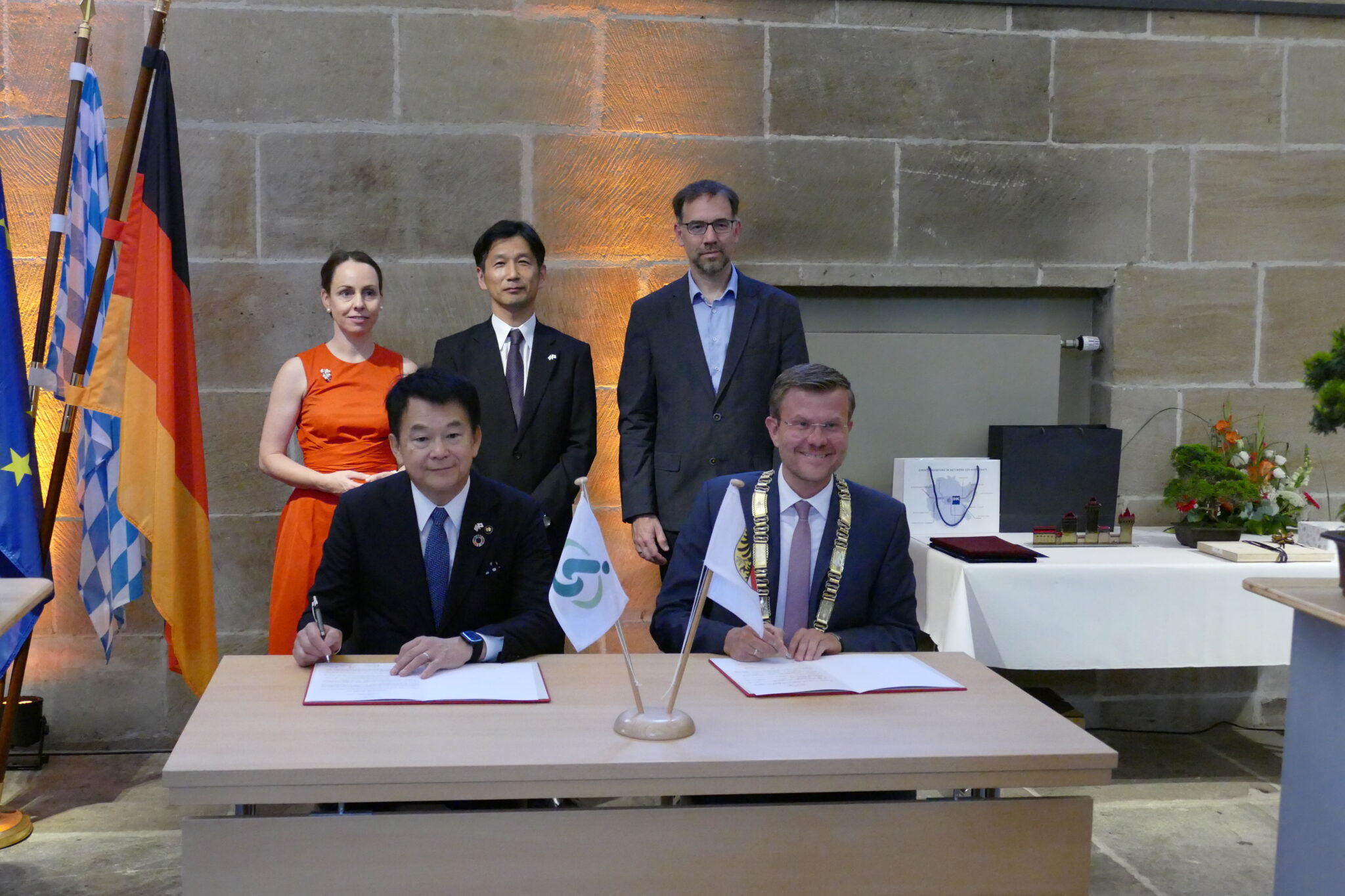

In the headline of the interview
“Thank you very much for taking the time for a short interview today.”
“Welcome to City Hall.
“Thank you very much!”
“Mr. König, which areas are impacted by the economic relationship with Japan?”
“In 2019, we signed an MoU where we all worked together to address topics like the economy and science.
Ultimately, it was also about building something with Japan, finding a city, and with Saitama, we found the
right partner city.”
“Then came the election, followed by the unfortunate arrival of COVID-19, and we had to ‘freeze’ the connections
for a while, as no exchanges could take place.”
“In 2022, I traveled to Japan—I was invited to a sustainability conference. At this conference, where I was
also a speaker, the focus was, of course, on sustainability and building stronger collaborations between our cities.”
“How do we transform our cities? How do we face climate change? I keep noticing, no matter where I am
in the world, cities everywhere face similar challenges. That’s why it’s so beneficial with Saitama, that we
can learn from each other. And today, because the MoU has lasted for five years, we’ve agreed to extend it.
We’ve also included a friendly city in Nuremberg, and that city is Saitama. Now, it’s not just about economy,
science, and knowledge transfer; it’s also about sports, culture. It’s about the major topic of tourism,
and we can learn from each other in those areas as well.”
“How did you come to connect with Japan of all places?”
“We already have two major Japanese partnerships in Nuremberg—one with Nürnberger Versicherung,
which is part of the Daido Group, a major insurance company in Japan, and another with C.Crystal, a research
institute with significant Japanese involvement. Then Saitama came into focus. We got to know each other,
and that’s why we’re always looking for new partnerships. Often, it’s personal relationships that play a key role.
The Mayor of Saitama and I got to know each other well in 2022, and from that, a friendship grew, which now
needs to bear fruit.”
“What exactly has changed compared to 2014?”
“In 2014, we had a few initial topics where we said, ‘Okay, let’s exchange ideas,’ and a small group of 2-3 people
would come together.
Today, the situation has changed significantly. Now, we have many representatives from Japanese companies
here in Nuremberg. We’ve almost tripled our engagement. We have a delegation of over 20 colleagues—
there’s a delegation from the IHK Saitama, representatives from companies in Saitama, and firms operating in Japan.
There’s close collaboration.
We have a strong connection with MoI
and IHK Middle Franconia or Nuremberg, and we’ve established a MoI with the city. It’s grown into
something much bigger.”
“What are your mid-term goals for this partnership?”
“Our mid-term goals are to continue discussing topics like how we transform our cities—focusing on housing,
more green spaces, and the major issue of mobility.
If I look at population structures, Japan faces a similar challenge: we’re aging, and we need young people
to work and take on responsibilities. We need young people to fill these roles—just like we do. This is also
about migration and integration. Japan has this challenge, and we’re facing it right now.
We can learn from each other in this regard, and we’re already doing that—through initiatives like working
with the immigration office.”
“What long-term goals do you have in mind?”
“The long-term goals involve building strong economic relationships, where both Nürnberg and companies
in Japan benefit. We want to create opportunities for businesses in Nuremberg and Middle Franconia
to engage with Japanese firms.
We aim to revive tourism—bringing many people from Saitama to Nuremberg, and also encouraging those
who live in Nuremberg to visit Saitama and Tokyo. ‘Look at Japan.’
In today’s globalized world, we all face certain challenges, but we need to learn from each other and get
to know one another. You can only truly understand a culture if you are willing to engage with it.
That’s what these city partnerships are for—they carry responsibility and help foster these networks and shared
experiences.”
“It’s been how long since you were last in Japan?”
“I have only been to Japan once, and that was for the conference. I gave a talk on climate change in Germany
and Nuremberg, and what we’re doing. The travel was quite long—I spent a total of 48 hours in Japan, in Saitama.
It took me about 40 hours to get there and roughly 48 hours to return. So, it was a long journey, a brief stay,
but a truly impressive experience.”
“When is your next visit to Japan planned?”
“Now, the guests have come, and we have a wonderful agreement in place. We will regularly exchange in video
conferences, as well as collaborate on the administrative levels. I expect that after the next election, when
I hopefully continue in this role, a trip to Japan will definitely be possible during my term.”
“Mr. König, I’m very grateful that you took the time; it was a wonderful interview.”
“You’re welcome, thank you for coming, and thank you for your interest in the German-Japanese and
Japanese-German relationship and friendship.”
“You’re very welcome!”
“Thank you very much!”
“I can help you create your advertising texts, publish PR campaigns, organize photoshoots, and everything
that makes you visible. Just let me know what you need, and I’ll make it happen for you.”
“All images, texts, interviews, and videos are copyrighted by Susanne Panhans.”